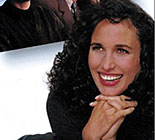|
|
|
|
Unstrung
Heroes
|
 |
|
In these high-strung days, the virtues of classical films – restrained, low-key, judiciously patterned – are often overlooked or underrated. One has to search among all the garish B movies in video shops to find such undervalued classical gems of recent years as Robert Mulligan's The Man in the Moon (1991) and Steven Soderbergh's King of the Hill (1993). These quiet, wise films represent the good side of what might be called the Wonder Years syndrome that has swept contemporary American filmmaking: unctuous coming of age stories heavy on life-lessons and voice-over narration, such as That Night (1992), Jack the Bear (1993) and My Girl 2 (1994). Like all these films good or bad, Unstrung Heroes is centred on a family, and on the vicissitudes of growing up. There is the familiar, reflective voice-over from small Steven (Nathan Watt), and even a barrage of scratchy home movies as obsessively documented by the father of this clan, Sid (John Turturro). But, within the loose coming-of-age genre, this is a special film. It is Diane Keaton's first theatrical feature as director after her superb telemovie Wildflower (1991). That was the story of an uncivilised wild-child slowly finding her place in the world. Most of the characters here are wildflowers too, in one way or another. Sid is a hyper-rationalist, devoted to the higher ideals of science and logic. It would have been easy for Keaton to portray Sid as a cold fish, but she deftly conveys both his deep love for his dying wife Selma (Andie MacDowell) and the exuberant craziness contained in his homemade inventions. Distressed by Selma's illness and distant from his father, Steven runs away to live with his two supposedly mad uncles, Arthur (Maury Chakin) and Danny (Michael Richards). It is from them that he receives a rather rich taste of the Jewish religion and heritage that his atheist parents have disavowed. Arthur is a naive artist of whom André Breton would have been proud. He records his dreams in pasted-up collages, and collects discarded balls from the gutter because he believes they contain the voices of children who once played with them. Arthur turns his over-crowded flat into a surreal shrine to such ephemeral mementos. Danny, on the other hand, is a classic paranoid-delusional, attune to signs of fascist mind-control conspiracies everywhere. After Danny is introduced falling into a room through a window and manically gesticulating, it is hard to forget that Richards plays Kramer in Seinfeld. Although a less sympathetic figure than Arthur, Danny's precarious journey through a harsh world becomes equally moving. Everybody in this familial portrait gallery is some kind of maladaptive nut. But Keaton's perspective on the material (scripted by the talented Richard LaGravenese) is generous and unwavering. She takes an unhysterical and unsentimental view of the so-called dysfunctional family unit. For her, this is a family that actually works, cemented by mutual love, flights of poetic fancy, and a unique set of shared rituals. This is a finely crafted film. Its unforced moments of high drama – observed by a respectfully distant camera – carry a real poignancy. MacDowell and Turturro have never been better utilised or guided on screen. And the Jewish, urban milieu of the piece, in its early 1960s period setting, is beautifully and concisely captured. Like all fine classical works, Unstrung Heroes has a self-effacing air. Unfortunately, in an industry that inexorably gravitates towards the grandiose and the glitzy, such delicate pieces tend to fall out the bottom of the movie market. But why should video or DVD be the only welcoming homes for jewels like this one? MORE Keaton: Hanging Up MORE LaGravanese: The Bridges of Madison County, Beloved, The Horse Whisperer, The Mirror Has Two Faces, A Little Princess, The Fisher King © Adrian Martin February 1996 |
![]()